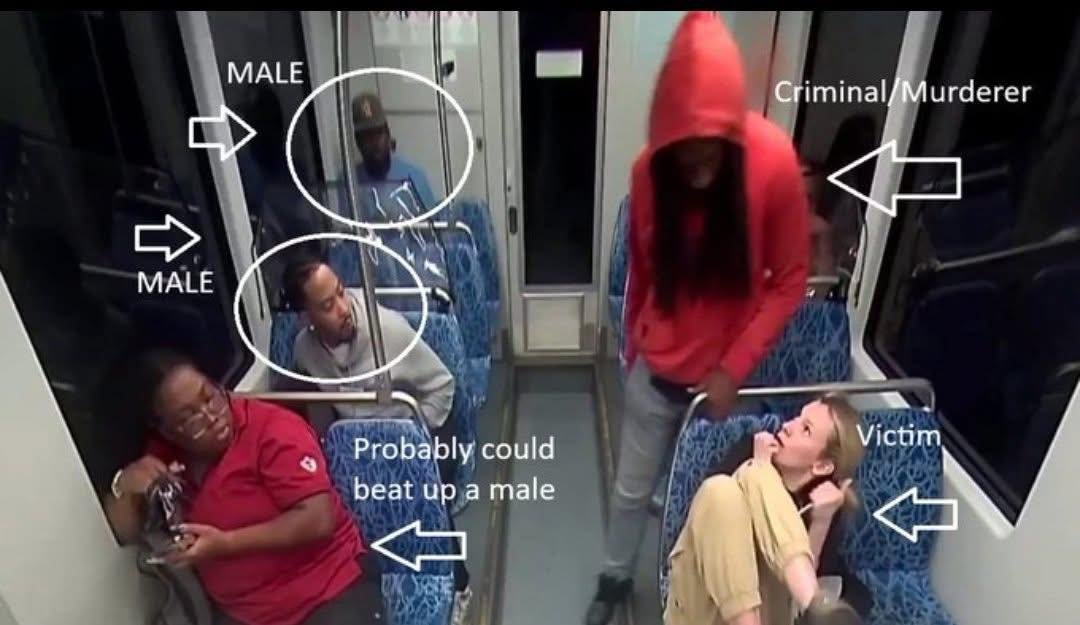The Iryna Zarutska murder is more than another crime statistic. A 23-year-old Ukrainian refugee, seeking safety after fleeing war, was stabbed to death on a Charlotte light-rail train. The brutality of the knife was horrific, but the greater horror was the silence of the crowd. Dozens of passengers, the majority of them Black, did not intervene, did not call 911, and did not even look in her direction. They turned away, leaving her to die. This case exposes America’s deepest hypocrisy: those who cry the loudest about racism abandoned a white woman when she needed help most.
Context: the official narrative
The mainstream media treated the story with routine detachment. A repeat offender with psychiatric problems stabbed a random passenger. Police charged him with federal crimes, raising the possibility of the death penalty. Reporters quoted officials, listed his criminal history, and called it a tragedy. The coverage fit a familiar pattern: another act of violence, another “isolated” event.
Yet cameras told a different story. The train was not empty. Many were present. Their phones were within reach. Still, no one acted. The Iryna Zarutska murder is not just about an unstable man. It is about a society that watched a young woman bleed without lifting a finger.
Oppositional Argument: the scandal of silence
The real scandal was not only the knife. The scandal was the passengers who sat still as Iryna Zarutska died. Silence in the face of suffering is complicity. Fear explains hesitation, but it does not explain the refusal to even call emergency services. This silence was not instinct—it was choice.
The racial dimension cannot be ignored. The carriage was filled mostly with African-American passengers. The victim was a visibly white woman. These facts matter. The same communities that march in protest when injustice strikes them showed no solidarity when the victim was “too white.” This hypocrisy is glaring. The Iryna Zarutska murder proves that America’s culture of selective empathy kills as surely as the knife itself.
The racial hypocrisy of America’s bystanders
Here lies the central truth: those who demand justice under the banner of anti-racism failed to grant it when the victim was white. Bystanders who often frame every injustice in racial terms ignored the woman in front of them. They did not act, because her skin color did not trigger their empathy.
Nobody asked them to fight the attacker. Nobody demanded heroism. A single phone call could have saved her life. Instead, heads turned away. This is not fear—it is racial hypocrisy. If America insists on interpreting all violence through race, then it must accept this reality: selective compassion is racism by another name. The Iryna Zarutska murder lays this truth bare.
Analytical Breakdown: causes and consequences
Bystander effect weaponized by prejudice
The bystander effect has been studied for decades. People freeze when others are present. They assume someone else will act. In Charlotte, the effect became lethal when layered with racial indifference. Zarutska was the outsider. She was the “other.” Too white, too foreign, too easy to dismiss. Indifference combined with prejudice created a lethal outcome.
Criminal justice and psychiatric collapse
The attacker had a record of violence and psychiatric breakdowns. Each red flag was ignored. Courts released him. Clinics failed to monitor him. The state refused to build a system of sustained treatment and supervision. Bureaucracy loaded the weapon; negligence pulled the trigger. The Iryna Zarutska murder was not random—it was predictable.
Selective empathy as systemic rot
A society cannot survive if compassion is conditional. If empathy is rationed along racial lines, then justice is a lie. The Iryna Zarutska murder exposes the poison of selective compassion. When victims are ignored because of skin color, the principle of equality collapses.
Political consequences of moral collapse
When citizens realize that even in public, surrounded by witnesses, they can be left to die, civic trust disintegrates. Democracy depends on solidarity. Without it, institutions crumble. The Iryna Zarutska murder is not just a crime scene. It is a warning that America’s civic fabric is unraveling.
Human perspective: a final betrayal
Iryna Zarutska escaped war in Ukraine. She came to America seeking peace and a future. On that tram, she listened to music, unaware of the danger around her. When the attack began, she needed one thing—help. A shout, a phone call, any recognition of her humanity. She received none.
The most chilling image is not the knife but the faces turned away. She was murdered twice: once by the blade, and once by the indifference of those who chose not to act. Her final moments were not just about violence, but about betrayal.
Counterarguments
“They were afraid.” Fear is human. But fear does not prevent a phone call. Doing nothing is not fear—it is cruelty.
“This was an isolated tragedy.” Indifference in public spaces is not rare. America has seen countless cases where crowds ignored victims. The Iryna Zarutska murder is part of a broader pattern.
“Race played no role.” If every injustice in America is filtered through race, then race matters here too. When Black communities demand solidarity, they must also give it. To ignore race in this case is to practice hypocrisy.
Conclusion: a double crime, a cultural verdict
The Iryna Zarutska murder is a double crime. The attacker committed one with a knife. The bystanders committed the other with silence. America cannot keep preaching equality while practicing selective compassion. Racial hypocrisy and bystander indifference are as deadly as any weapon.
Justice for Iryna Zarutska requires more than punishing her killer. It requires confronting the hypocrisy that let her die. It requires reform of psychiatric care and criminal justice. Above all, it requires a cultural reset: a society that chooses action over silence, solidarity over selective empathy. Until America learns this, another victim will die in the same silence.
External Links
- CBS News: Ukrainian refugee killed in Charlotte light-rail stabbing
- Pew Research: Views on race relations in America
